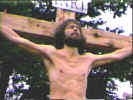York Corpus Christi Play -- Introduction
 The
York Corpus Christi Cycle, a collection of brief plays that together tell Biblical
history from Creation to Doomsday,
was the most complex of the medieval cycles (see: "Simulation
of York Corpus Christi Play" [requires Java]).
The
York Corpus Christi Cycle, a collection of brief plays that together tell Biblical
history from Creation to Doomsday,
was the most complex of the medieval cycles (see: "Simulation
of York Corpus Christi Play" [requires Java]).
The York Corpus Christi Play
Staging
of the York Corpus Christi Play
The surviving manuscript of 48 plays (with a combined
length four times that of the longest Hamlet text) and the civic and
guild records of the town of York tell us that each short play, mounted
on an individual stage-wagon, was pulled
through the streets of York, stopping to perform for audiences that
had gathered at predetermined "stations" along the route.
08 Jun 1579
A Christ Taken Prisoner
The actor playing Judas is bribed to push "Jesus" off the stage and into the arms of angry debtors. This historical anecdote perfectly illustrates the fuzziness of the borders between the religious life, public life, play-acting, and real life in medieval Europe.24 Apr 2000
"Judas" Dies During Passion Play
Rome: A 23-year-old Italian man died during an Easter re-enactment of Christ's passion, probably because the noose he was wearing in the role of Judas Iscariot was too tight, police said Sunday.
Origin and History of the
York Corpus Christi Play
The York play was already a long-established tradition
by the end of the 14th century, and continued until actively crushed
by Protestant Reformers in the late 16th century. Nobody knows exactly
how it started, but it seems to have begun with a bang -- by the time
we first hear of it, it is already huge and well-established.
Glossary of Terms: Medieval
Religious Drama
Having trouble understanding the difference between the Assumption
and the Ascension? Between adoration
and veneration? The Immaculate
Conception and the Virgin Birth? This
glossary will help.
by Dennis
G. Jerz
June, 1997 -- first published in (Re)Soundings
16 Jul 1999 -- posted here
08 Jan 2001 -- minor edits
09 Jun 2004 -- Gunkel link added
| See Also |
| The
Corpus Christi Procession [in modern Poland] |
